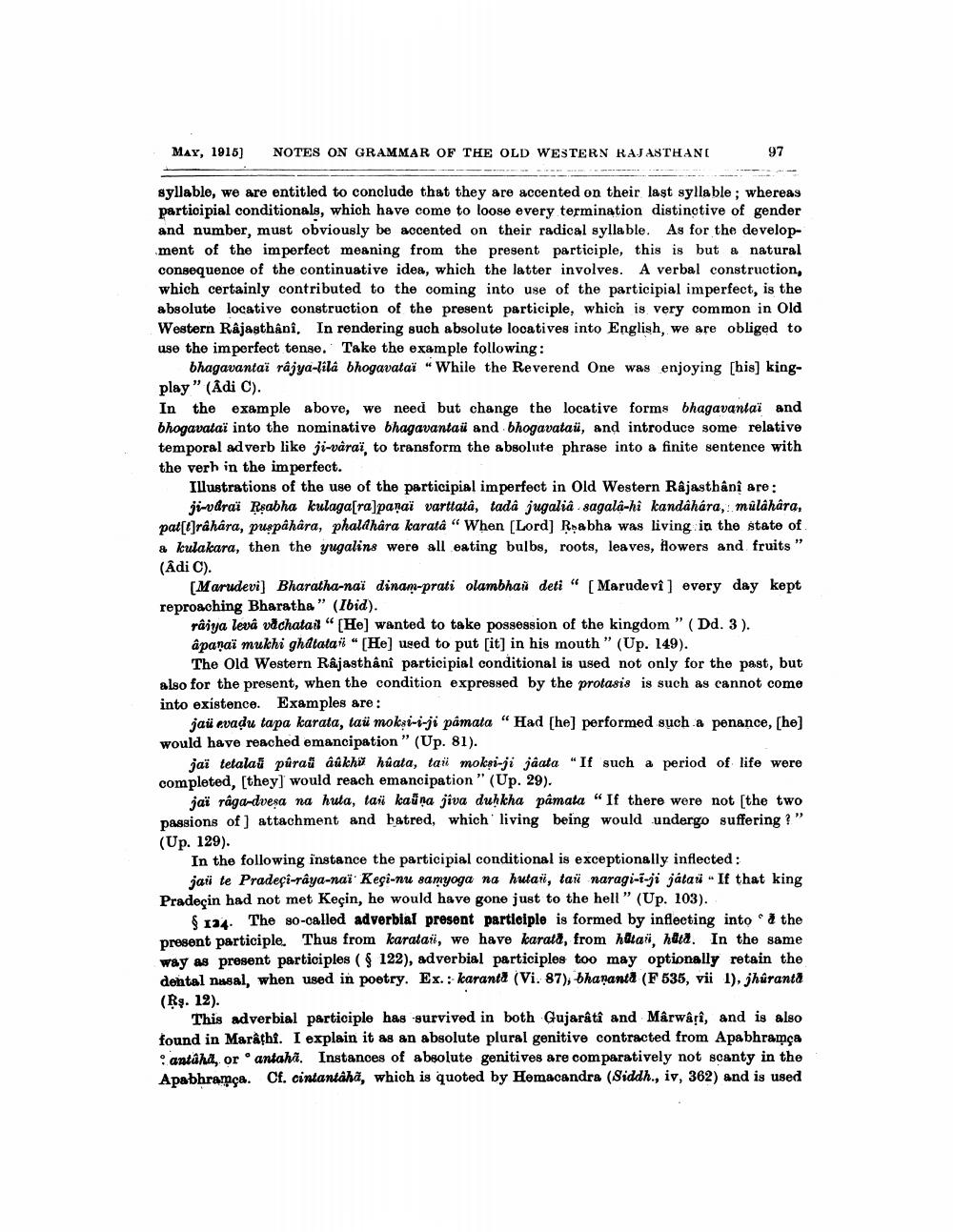________________
MAY, 1916)
NOTES ON GRAMMAR OF THE OLD WESTERN RAJASTHANI
97
syllable, we are entitled to conclude that they are accented on their last syllable; whereas participial conditionals, which have come to loose every termination distinctive of gender and number, must obviously be accented on their radical syllable. As for the development of the imperfect meaning from the present participle, this is but a natural consequence of the continuative idea, which the latter involves. A verbal construction, which certainly contributed to the coming into use of the participial imperfect, is the absolute locative construction of the present participle, which is very common in Old Western Rajasthani, In rendering such absolute locatives into English, we are obliged to use the imperfect tense. Take the example following:
bhagavantaï rajya-lila bhogavataï " While the Reverend One was enjoying [his) kingplay" (Adi C). In the example above, we need but change the locative forms bhagavantai and bhogavataí into the nominative bhagavantai and bhogavataü, and introduce some relative temporal adverb like ji-varaï, to transform the absolute phrase into a finite sentence with the verh in the imperfect.
Illustrations of the use of the participial imperfect in Old Western Rajasthani are:
ji-varai Rsabha kulaga[ra]paņai varttata, tada jugalia sagala-hi kandahara, mülahára, pat[i]rahara, puspáhara, phaldhara karata” When (Lord) Rşabha was living in the state of & kulakara, then the yugalins were all eating bulbs, roots, leaves, Howers and fruits" (Adi C).
[Marudevi] Bharatha-naï dinam-prati olambhaŭ deti" (Marudevî ] every day kept reproaching Bharatha" (Ibid).
râiya levá vá chatait" (He) wanted to take possession of the kingdom" (Dd. 3). apaņai mukhi ghatatari " (He) used to put [it] in his mouth" (Up. 149).
The Old Western Rajasthani participial conditional is used not only for the past, but also for the present, when the condition expressed by the protasis is such as cannot come into existence. Examples are:
jaü evadu tapa karata, tai moksi-i-ji pamata "Had [he] performed such a penance, [he] would have reached emancipation " (Up. 81).
jai tetalaü pûrau âûkhu hûata, taii moksi-ji jaata "If such a period of life were completed, [they would reach emancipation" (Up. 29).
jaï râga-dvesa na huta, tai kaina jiva duh kha pamata "If there were not [the two passions of ] attachment and batred, which living being would undergo suffering ?" (Up. 129).
In the following instance the participial conditional is exceptionally inflected:
jai te Pradeçi-raya-nai Kega-nu samyoga na hutai, tač naragi-i-ji játai - If that king Pradeçin had not met Keçin, he would have gone just to the hell" (Up. 103).
124. The so-called adverbial present participle is formed by infleeting into the present participle. Thus from karatai, we have karata, from hdla, hata. In the same way as present participles (9 122), adverbial participles too may optionally retain the dental nusal, when used in poetry. Ex.: karanta (Vi. 87), bhanants (F 535, vii 1), jhûranta (Rş. 12).
This adverbial participle has survived in both Gujarati and Mârwârî, and is also found in Marathi. I explain it as an absolute plural genitive contracted from Apabhramça : antähd, or antaha. Instances of absolute genitives are comparatively not scanty in the Apabhramca. Cf. cintantaha, which is quoted by Hemacandra (Siddh., iv, 362) and is used




